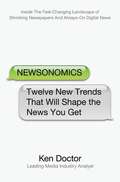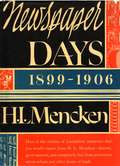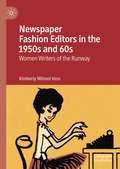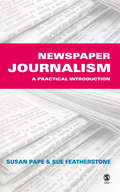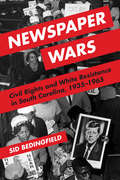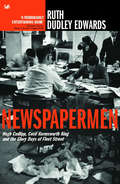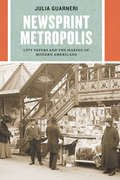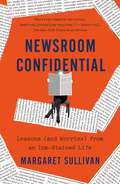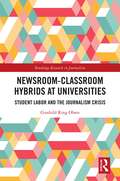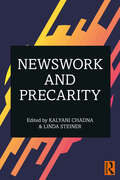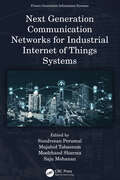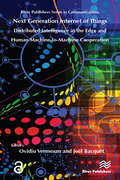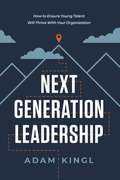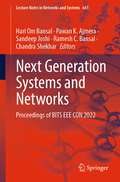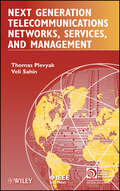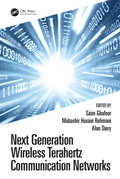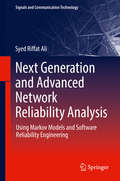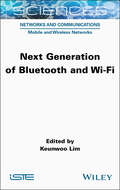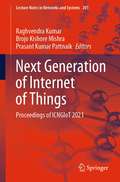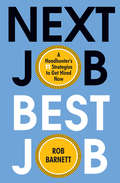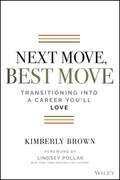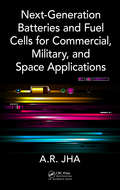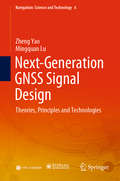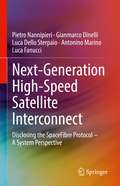- Table View
- List View
Newsonomics: Twelve New Trends that Will Shape the News You Get
by Ken DoctorThe New News: Reports of the death of the news media are highly premature, though you wouldn't know it from the media's own headlines. Ken Doctor goes far beyond those headlines, taking an authoritative look at the fast-emerging future. The Twelve Laws of Newsonomics reveal the kinds of news that readers will get and that journalists (and citizens) will produce as we enter the first truly digital news decade. A new Digital Dozen, global powerhouses from The New York Times, News Corp, and CNN to NBC, the BBC, and NPR will dominate news across the globe, Locally, a colorful assortment of emerging news players, from Boston to San Diego, are rewriting the rules of city reporting, Newsonomics provides a new sense of the news we'll get on paper, on screen, on the phone, by blog, by podcast, and via Facebook and Twitter. It also offers a new way to understand the why and how of the changes, and where the Googles, Yahoos and Microsofts fit in. Newsonomics pays special attention to media and journalism students in a chapter on the back-to-the-future skills they'll need, while marketing professionals get their own view of what the changes mean to them.
Newspaper Days: 1899-1906 (H.L. Mencken's Autobiography)
by H. L. MenckenOriginally published: New York: Knopf, 1941.
Newspaper Fashion Editors in the 1950s and 60s: Women Writers of the Runway
by Kimberly Wilmot VossThis book documents the careers of newspaper fashion editors and details what the fashion sections included in the post-World War II years. The analysis covers social, political and economic aspects of fashion. It also addresses journalism ethics, fashion show reporting and the decline in fashion journalism editor positions.
Newspaper Journalism: A Practical Introduction
by Susan Featherstone Susan Pape'As well as guides on how to report courts and councils, Newspaper Journalism offers tips on how to write both news stories and features and how to make and keep contacts. The tips are packed with real life examples from journalists working on provincial newspapers. A worthwhile read - and not just for the latest newshound to join the press pack' - www.HoldtheFrontPage.co.uk 'This is lucid, lean and up-to-date introduction to newspaper journalism and how to do it' - Jane Taylor, The Surrey Institute of Art and Design A practical introduction to journalism, and the broader context in which journalists operate, Newspaper Journalism covers the key elements and distinctive features that constitute good newspaper journalism. Engagingly written, the book is also a rich resource of real life examples, anecdotes, case studies and exercises. Susan Pape and Susan Featherstone have drawn on their considerable experience to provide a solid grounding in the principles and practice of newspaper journalism. The resulting book recognises the needs of the profession and those seeking to enter it.
Newspaper Wars: Civil Rights and White Resistance in South Carolina, 1935-1965
by Sid BedingfieldAgainst all odds, the seeds of social change found purchase in mid-twentieth century South Carolina. Newspaperman John McCray and his allies at the Lighthouse and Informer challenged readers to "rebel and fight"--to reject the "slavery of thought and action" and become "progressive fighters" for equality. Newspaper Wars traces the role journalism played in the fight for civil rights in South Carolina from the 1930s through the 1960s. Moving the press to the center of the political action, Sid Bedingfield tells the stories of the long-overlooked men and women on the front lines of a revolution. African American progress sparked a battle to shape South Carolina's civic life, with civil rights activists arrayed against white journalists determined to preserve segregation through massive resistance. As that strategy failed, white newspapers turned to overt political action and crafted the still-prevalent narratives that aligned southern whites with the national conservative movement. A fascinating portrait of a defining time, Newspaper Wars analyzes the role journalism played--and still can play--during times of social, cultural, and political change.
Newspapermen: Hugh Cudlipp, Cecil Harmsworth King and the Glory Days of Fleet Street
by Ruth Dudley EdwardsThey were 'Cudlipp' and 'Mr King' when they met in 1935. At 21, gregarious, extrovert and irreverent Hugh Cudlipp had many years of journalistic experience: at 34, shy, introspective and solemn Cecil Harmsworth King, haunted by the ghost of Uncle Alfred, Lord Northcliffe, the great press magnate, and bitter towards Uncle Harold, Lord Rothermere of the Daily Mail, was fighting his way up in the family business. Opposites in most respects, they were complementary in talents and had in common a deep concern for the underdog. Cudlipp, the journalistic genius, and King, the formidable intellect, were to become, in Cudlipp's words, 'the Barnum and Bailey' of Fleet Street. Together, on the foundation of the populist Daily Mirror, they created the biggest publishing empire in the world. Yet their relationship foundered sensationally in 1968, when - as King tried to topple the Prime Minister - Cudlipp toppled King. Through the story of two extraordinary men, Ruth Dudley Edwards gives us a riveting portrait of Fleet Street in its heyday.
Newsprint Metropolis: City Papers and the Making of Modern Americans
by Julia GuarneriAt the close of the nineteenth century, new printing and paper technologies fueled an expansion of the newspaper business. Newspapers soon saturated the United States, especially its cities, which were often home to more than a dozen dailies apiece. Using New York, Philadelphia, Milwaukee, and Chicago as case studies, Julia Guarneri shows how city papers became active agents in creating metropolitan spaces and distinctive urban cultures. Newsprint Metropolis offers a vivid tour of these papers, from the front to the back pages. Paying attention to much-loved features, including comic strips, sports pages, advice columns, and Sunday magazines, she tells the linked histories of newspapers and of the cities they served. Guarneri shows how themed sections for women, businessmen, sports fans, and suburbanites illustrated entire ways of life built around consumer products. But while papers provided a guide to individual upward mobility, they also fostered a climate of civic concern and responsibility. Charity campaigns and metropolitan sections painted portraits of distinctive, cohesive urban communities. Real estate sections and classified ads boosted the profile of the suburbs, expanding metropolitan areas while maintaining cities’ roles as economic and information hubs. All the while, editors were drawing in new reading audiences—women, immigrants, and working-class readers—helping to give rise to the diverse, contentious, and commercial public sphere of the twentieth century.
Newsroom Confidential: Lessons (and Worries) from an Ink-Stained Life
by Margaret Sullivan"Sullivan remains the critic American journalism requires, a veteran practitioner with street cred, still in touch with the ‘unaccountable joy’ of reporting and writing that continues to draw talented young people to the field.” —Steve Coll, The New York Times Book ReviewSullivan began her career at the Buffalo News, where she rose from summer intern to editor in chief. In Newsroom Confidential she chronicles her years in the trenches battling sexism and throwing elbows in a highly competitive newsroom. In 2012, Sullivan was appointed the public editor of The New York Times, the first woman to hold that important role. She was in the unique position of acting on behalf of readers to weigh the actions and reporting of the paper's staff, parsing potential lapses in judgment, unethical practices, and thorny journalistic issues. Sullivan recounts how she navigated the paper’s controversies, from Hillary Clinton's emails to Elon Musk's accusations of unfairness to the need for greater diversity in the newsroom. In 2016, having served the longest tenure of any public editor, Sullivan left for the Washington Post, where she had a front-row seat to the rise of Donald Trump in American media and politics.With her celebrated mixture of charm, sharp-eyed observation, and nuanced criticism, Sullivan takes us behind the scenes of the nation's most influential news outlets to explore how Americans lost trust in the news and what it will take to regain it.
Newsroom-Classroom Hybrids at Universities: Student Labor and the Journalism Crisis (Routledge Research in Journalism)
by Gunhild Ring OlsenThis book investigates the success of U.S. nonprofit university centers, where students work alongside investigative reporters, from a professional and educational perspective. Drawing on a detailed investigation of four of the most prominent and renowned centers in the U.S. – the IRP Berkeley (UC Berkeley), the Stabile Center (Columbia University), the Workshop (American University), and the New England CIR (Boston University) – the newsroom role and the classroom role of university nonprofits is examined. Finding the description of a win-win situation – where overstretched newsrooms get extra resources; while students learn from the best – an oversimplification, the author explores learning outcomes, student experiences, financial benefits, and quality of the student output. Offering an in-depth analysis of the characteristics, challenges and benefits of different forms of journalistic cooperation, this book will be a useful resource to scholars, students and practitioners of journalism, journalism education, and media practice.
Newswork and Precarity
by Linda Steiner Kalyani ChadhaThis edited collection brings together leading scholars from around the world to discuss the consequences and implications of precarious labor conditions within the modern news industry. In 14 original chapters, contributors address global concerns in journalism across all platforms, based on the assumption that unstable employment conditions affect the extent to which journalists can continue to play their historically crucial role in sustaining democracies. Topics discussed include work conditions for freelancers and entrepreneurial journalists as well as the risks facing conflict reporters, precarity in media start-ups, unionization and other collective efforts, policies regulating journalistic labor around the world, and the impact of hedge fund money on newswork. Drawing on case studies and data from South America, Africa, the United States, Canada, Mexico, the United Kingdom, and continental Europe, the book highlights how media outlets are forcing newsworkers to work harder for less money, and few countries are proactive in alleviating the precarity of journalists. Newswork and Precarity is a valuable addition to an important still-emerging area in journalism studies that will be of interest to both professionals and scholars of journalism, media studies, sociology, and labor history.
Next Generation Communication Networks for Industrial Internet of Things Systems (Future Generation Information Systems)
by Moolchand Sharma Sundresan Perumal Mujahid Tabassum Saju MohananThis book presents Internet of Things (IoT) technology and security-related solutions that employ intelligent data processing technologies and machine learning (ML) approaches for data analytics. It presents practical scenarios from the industry for the application of the internet of things in various domains. Next Generation Communication Networks for Industrial Internet of Things Systems presents concepts and research challenges in communication networking for Industrial internet of things systems. Features: Discusses process monitoring, environmental monitoring, control, and maintenance monitoring. Covers data collection and communication protocols in a comprehensive manner. Highlights the internet of things industrial applications, and industrial revolution 4.0. Presents 5G-enabled internet of things technology and architecture. Showcases artificial intelligence techniques in the IoT networks. It will serve as an ideal reference text for senior undergraduate, graduate students, and academic researchers in the areas of electrical engineering, electronics, and communications engineering, computer engineering, and information technology.
Next Generation Internet of Things – Distributed Intelligence at the Edge and Human-Machine Interactions
by Ovidiu Vermesan Joël BacquetThis book provides an overview of the next generation Internet of Things (IoT), ranging from research, innovation, development priorities, to enabling technologies in a global context. It is intended as a standalone in a series covering the activities of the Internet of Things European Research Cluster (IERC), including research, technological innovation, validation, and deployment.The following chapters build on the ideas put forward by the European Research Cluster, the IoT European Platform Initiative (IoT–EPI), the IoT European Large-Scale Pilots Programme and the IoT European Security and Privacy Projects, presenting global views and state-of-the-art results regarding the next generation of IoT research, innovation, development, and deployment.The IoT and Industrial Internet of Things (IIoT) are evolving towards the next generation of Tactile IoT/IIoT, bringing together hyperconnectivity (5G and beyond), edge computing, Distributed Ledger Technologies (DLTs), virtual/ andaugmented reality (VR/AR), and artificial intelligence (AI) transformation.Following the wider adoption of consumer IoT, the next generation of IoT/IIoT innovation for business is driven by industries, addressing interoperability issues and providing new end-to-end security solutions to face continuous treats.The advances of AI technology in vision, speech recognition, natural language processing and dialog are enabling the development of end-to-end intelligent systems encapsulating multiple technologies, delivering services in real-time using limited resources. These developments are focusing on designing and delivering embedded and hierarchical AI solutions in IoT/IIoT, edge computing, using distributed architectures, DLTs platforms and distributed end-to-end security, which provide real-time decisions using less data and computational resources, while accessing each type of resource in a way that enhances the accuracy and performance of models in the various IoT/IIoT applications.The convergence and combination of IoT, AI and other related technologies to derive insights, decisions and revenue from sensor data provide new business models and sources of monetization. Meanwhile, scalable, IoT-enabled applications have become part of larger business objectives, enabling digital transformation with a focus on new services and applications.Serving the next generation of Tactile IoT/IIoT real-time use cases over 5G and Network Slicing technology is essential for consumer and industrial applications and support reducing operational costs, increasing efficiency and leveraging additional capabilities for real-time autonomous systems.New IoT distributed architectures, combined with system-level architectures for edge/fog computing, are evolving IoT platforms, including AI and DLTs, with embedded intelligence into the hyperconnectivity infrastructure.The next generation of IoT/IIoT technologies are highly transformational, enabling innovation at scale, and autonomous decision-making in various application domains such as healthcare, smart homes, smart buildings, smart cities, energy, agriculture, transportation and autonomous vehicles, the military, logistics and supply chain, retail and wholesale, manufacturing, mining and oil and gas.
Next Generation Leadership: How to Ensure Young Talent Will Thrive with Your Organization
by Adam KinglEmployers who refuse to adapt to the expectations of younger generations are losing out on top talent, as they leave for positions at companies with more modern practices. Learn what companies need to do to fit into the new normal in the workplace.Generation Y sees the world differently than any other generation in modern memory. And nowhere is this more evident than in the workplace. The astronomical shifts that this generation has seen in the economy, technology, and the world have changed what they want from life and work--which is not a 9-5 existence for forty-plus years, leading to a typical retirement at sixty-five. What older generations call a poor work ethic from a spoiled generation, Gen Y sees as a different way of doing things. Companies that don&’t get on board risk losing the diverse, young talent that is critical for them to be able to compete.Companies that take the time to listen realize that what Gen Y is asking for isn&’t that crazy; in fact, it&’s better in many ways.A demand for work-life balance isn&’t a cry for fewer work hours--it&’s a cry to be able to work from outside the office beyond a rigid 9-5 schedule (which can lead, ironically, to Gen Y employees working even more hours than you expected).Leaving a job after a couple years isn&’t an inability to commit--it&’s a need to learn more, expand their experience, and develop their career at a faster pace, something that is helpful to companies that hire those individuals, including your own.Elevating nontraditional benefits over financial benefits is a step toward creating an emotional connection to the company where employees spend the majority of their time and invest significant mental and emotional efforts.The need to work for a company with a purpose is a reflection of the power that social media has had on the social consciousness.This book will explore what&’s behind these shifts in the character of the emerging workforce. It shows that, as Gen Y assumes managerial positions, the nature of leadership and business will change over the next few decades in irrevocable and profound ways.
Next Generation Marine Wireless Communication Networks (Wireless Networks)
by Lin X. Cai Bin Lin Jianli Duan Mengqi HanThis book presents a novel framework design for the next generation Marine Wireless Communication Networks (MWCNs). The authors first provide an overview of MWCNs, followed by a discussion of challenges in the design and development of MWCNs in support of a diversity of marine services such as real-time marine monitoring, offshore oil exploration, drilling, marine tourism and fishing. The authors then propose cross layer networking solutions to achieve a high performance modern MWCN that enables efficient and reliable data transmissions under hostile marine environment, which include the network deployment, the physical layer channel coding, intelligent network access and resource management, and learning-based opportunistic routing. Finally, the authors summarize the book and present some open issues that will lead to new research directions in the next generation MWCNs.
Next Generation Systems and Networks: Proceedings of BITS EEE CON 2022 (Lecture Notes in Networks and Systems #641)
by Ramesh C. Bansal Chandra Shekhar Sandeep Joshi Hari Om Bansal Pawan K. AjmeraThe book is a collection of high-quality research papers presented at International Conference on Next Generation Systems and Networks (BITS EEE CON 2022), held at Birla Institute of Technology & Science, Pilani, Rajasthan, India, during November 4–5, 2022. This book provides reliable and efficient design solutions for the next-generation networks and systems. The book covers research areas in energy, power and control; communication and signal processing; and electronics and nanotechnology.
Next Generation Telecommunications Networks, Services, and Management (IEEE Press Series on Networks and Service Management #15)
by Veli Sahin Thomas PlevyakAn unprecedented look into the present and future of next generation networks, services, and management in the telecommunications industry The telecommunications industry has advanced in rapid, significant, and unpredictable ways into the twenty-first century. Next Generation Telecommunications Networks, Services, and Management guides the global industry and academia even further by providing an in-depth look at current and developing trends, as well as examining the complex issues of developing, introducing, and managing cutting-edge telecommunications technologies. This is an orchestrated set of original chapters written expressly for this book by topic experts from around the globe. It addresses next generation technologies and architectures, with the focus on networks, services, and management. Key topics include: Opportunities and challenges of next generation telecommunications networks, services, and management Tri/Quad Play and IP-based networks and services Fault, Configuration, Accounting, Performance, and Security (FCAPS) requirements Convergence and an important convergence vehicle, IP Multimedia Subsystem (IMS) Next generation operations and network management architecture Ad hoc wireless and sensor networks and their management Next generation operations and network management standards from a strategic perspective A defining look at the future in this field This book will serve as a contemporary reference for the growing global community of telecommunication and information professionals in industry, government, and academia. It will be important to faculty and graduate students of telecommunications as a graduate textbook.
Next Generation Wireless Terahertz Communication Networks
by Saim GhafoorThe rapid growth of the data traffic demands new ways to achieve high-speed wireless links. The backbone networks, data centers, mission-critical applications, as well as end-users sitting in office or home, all require ultra-high throughput and ultra-low latency wireless links. Sophisticated technological advancement and huge bandwidth are required to reduce the latency. Terahertz band, in this regard, has a huge potential to provide these high-capacity links where a user can download the file in a few seconds. To realize the high-capacity wireless links for future applications, in this book, different aspects of the Terahertz band wireless communication network are presented. This book highlights the Terahertz channel characteristics and modeling, antenna design and beamforming, device characterization, applications, and protocols. It also provides state-of-the-art knowledge on different communication aspects of Terahertz communication and techniques to realize the true potential of the Terahertz band for wireless communication.
Next Generation and Advanced Network Reliability Analysis: Using Markov Models and Software Reliability Engineering (Signals and Communication Technology)
by Syed Riffat AliThis book covers reliability assessment and prediction of new technologies such as next generation networks that use cloud computing, Network Function Virtualization (NVF), Software Defined Network (SDN), Next Generation Transport, Evolving Wireless Systems, Digital VoIP Telephony, and Reliability Testing techniques specific to Next Generation Networks (NGN). This book introduces the technology to the reader first, followed by advanced reliability techniques applicable to both hardware and software reliability analysis. The book covers methodologies that can predict reliability using component failure rates to system level downtimes. The book’s goal is to familiarize the reader with analytical techniques, tools and methods necessary for analyzing very complex networks using very different technologies. The book lets readers quickly learn technologies behind currently evolving NGN and apply advanced Markov modeling and Software Reliability Engineering (SRE) techniques for assessing their operational reliability.Covers reliability analysis of advanced networks and provides basic mathematical tools and analysis techniques and methodology for reliability and quality assessment;Develops Markov and Software Engineering Models to predict reliability;Covers both hardware and software reliability for next generation technologies.
Next Generation of Bluetooth and Wi-Fi (ISTE Invoiced)
by Keunwoo LimThis book helps readers to understand the past (overview of technologies), current (how they are evolving) and the future (adaptation to new trends) of two representative communication technologies, Wi-Fi and Bluetooth. Wi-Fi and Bluetooth are technologies that are very familiar to us in our everyday lives. However, these technologies have evolved throughout the years to meet the continuously changing demands of users. Evolution of these technologies can be difficult to understand, even for professionals in the field of computer science and engineering, due to the extensiveness and complexity of written documents (technical standards and specifications are not very reader-friendly!). Next Generation of Bluetooth and Wi-Fi summarizes the key functions of Wi Fi and Bluetooth to show how they adapt to new environments and requirements. We introduce the new concepts that allow them to shift into the new paradigm of IoT and beyond, and we propose ideas and insights on how they could also possibly evolve in the future, integrated with other fascinating technologies.
Next Generation of Internet of Things: Proceedings of ICNGIoT 2021 (Lecture Notes in Networks and Systems #201)
by Prasant Kumar Pattnaik Raghvendra Kumar Brojo Kishore MishraThis book includes selected papers from the International Conference on Next Generation of Internet of Things (ICNGIoT 2021), organized by the Department of Computer Science and Engineering, School of Engineering, GIET University, Gunupur, Odisha, India, during 5–6 February 2021. The book covers topics such as IoT network design and architecture, IoT network virtualization, IoT sensors, privacy and security for IoT, SMART environment, social networks, data science and data analytics, cognitive intelligence and augmented intelligence, and case studies and applications.
Next Job, Best Job: A Headhunter's 11 Strategies to Get Hired Now
by Rob Barnett"This generous and useful book strips away the shame and fear from a job search and can help you get past the resume and see a better way forward." —Seth Godin, bestselling author of This is Marketing If you&’re struggling to find work in an uncertain job market, Next Job, Best Job by headhunter Rob Barnett delivers game changing strategies to get you hired now. For readers at any phase of a career, Barnett saves you months of wasted time surfing random job postings and uploading resumes into oblivion. His new process gives you the end-to-end tools to find the work you want. Rob Barnett is an innovator, a two-time entrepreneur, and a senior executive with five decades inside legendary media companies. As an advisor to thousands of job seekers and company heads, he is uniquely positioned to disrupt the job search industry. His inclusive platform is a life-saving escape hatch during the darkest hours of unemployment and an expert guide to the work you deserve. With humor, compassion, and a healthy dose of tough love, Barnett covers everything from the essentials of a modern job search to ageism, ghosting, navigating LinkedIn and Zoom, and mastering the voodoo of social media. Pivot from worrying to winning with inspired steps to: * Score perfect job interviews * Negotiate like a pro and get to &“yes&” * Rebrand yourself with a unique resume, digital profile, and killer cover letter * Ignite focus and restore motivation * Identify the best career path * Define the right job title * Get immediate replies and callbacks * Master networking * Banish self-defeating thoughts * Embrace success * Pay it forward New strategies replace ancient job search rules that lead nowhere. Rise above every other candidate with an empowering, easy method that finally works.
Next Move, Best Move: Transitioning Into a Career You'll Love
by Kimberly BrownAn expert guide for professionals seeking to understand how to navigate the world of work. Kimberly Brown, author of Next Move, Best Move: Transitioning into a Career You'll Love, leaves no stone unturned with this thorough, expert guide for professionals seeking to understand how to navigate the world of work, from beginning to end, starting with uncovering personal and professional values in an effort to align their expertise and skills to roles and companies that will finally change the trajectory of their career and set them up to be leaders in the workforce. As a former career development adviser in some of the nation's top universities and a diversity + inclusion professional in a Fortune 100 company, Brown has recognized that people work for the sake of working without understanding how to leverage their unique gifts and position themselves for success. As a result, Next Move, Best Move: Transitioning into a Career You'll Love shares transformational lessons to ensure success and puts the ball back in your court. In Brown's highly acclaimed book, a specific, effective framework is unveiled to ensure each reader channels and utilizes their highest potential as they regain control and steer professional opportunities in their favor, gaining key information as to: Taking stock of their experiences to ensure strategic career moves Discovering how to cultivate and maintain fruitful relationships that support career growth Uncovering how to build a two-year career strategy to move you into future leadership positions Gaining a deeper look into personal and professional branding to ensure alignment with leadership capabilities and career goals Learning how to use their voice in the workplace to advocate for themselves
Next-Generation Batteries and Fuel Cells for Commercial, Military, and Space Applications
by A.R. JhaDistilling complex theoretical physical concepts into an understandable technical framework, Next-Generation Batteries and Fuel Cells for Commercial, Military, and Space Applications describes primary and secondary (rechargeable) batteries for various commercial, military, spacecraft, and satellite applications for covert communications, surveillan
Next-Generation GNSS Signal Design: Theories, Principles and Technologies (Navigation: Science and Technology #6)
by Mingquan Lu Zheng YaoThis book systematically discusses the signal design theory and technologies for next-generation satellite navigation systems. It provides comprehensive information on the basic concept, theory, and key technologies employed in satellite navigation system signal design. Starting from the basic elements of the navigation signal, it combines traditional and advanced technologies into an organic whole, offering readers a complete system for signal design. Thanks to its rich content and clear structure, it is well suited as a reference guide for researchers and engineers in the fields of satellite navigation, positioning, etc. The book can also be used as teaching material or supplemental reading material by professors and graduate students alike.
Next-Generation High-Speed Satellite Interconnect: Disclosing the SpaceFibre Protocol – A System Perspective
by Luca Fanucci Pietro Nannipieri Gianmarco Dinelli Luca Dello Sterpaio Antonino MarinoThis book introduces the space community to the novel SpaceFibre protocol, developed under the guidance of the European Space Agency (ESA) as the forthcoming, high speed (Gbps) communication protocol for satellite on-board communication. Since SpaceFibre is expected to follow the success of its predecessor SpaceWire protocol (Mbps), the authors provide a system-level perspective for the end-user willing to adopt this latest technology for future space missions. The authors provide a complete view of the SpaceFibre protocol, together with an analysis of all the necessary hardware and software components to integrate this technology onboard a satellite. The text guides potential system adopters toward understanding the protocol, analyzing strengths, weaknesses and performances. Practical design examples and prototype performance measurements in reference scenarios are also included.
